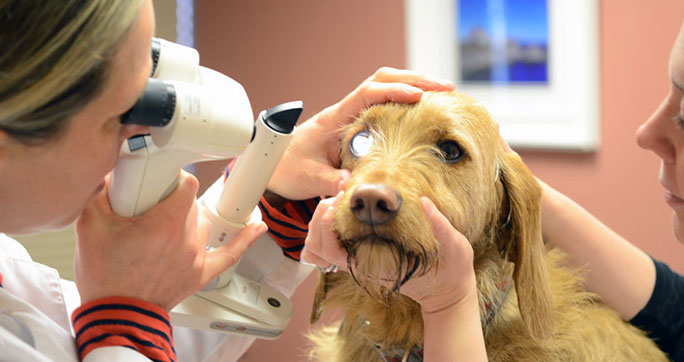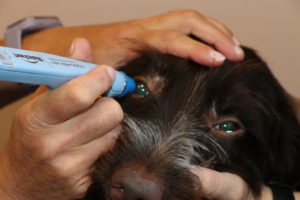Ophthalmology
This service is currently unavailable. We strive to provide comprehensive care for all of your pet’s needs, including specialized services in ophthalmology. We are actively searching for a Board-Certified Veterinary Ophthalmologist to join our team and we are committed to filling this vital role as soon as possible to continue offering the highest level of care for your beloved pets. Please feel free to reach out to us with any questions or concerns you may have.
Ophthalmology has made many advances over the years. A board-certified veterinary ophthalmologist specializes in the diagnosis, treatment, and surgery of conditions involving the eyes, such as glaucoma, uveitis, cataracts, corneal trauma, and more.
WHAT IS A VETERINARY OPHTHALMOLOGIST?
Firstly, a veterinary ophthalmologist specializes in the treatment of animal eye diseases. To become a veterinary ophthalmologist one must first graduate from a four-year veterinary school. Next, complete a one-year internship in medicine and surgery, then complete a three-year or longer residency training program in veterinary ophthalmology, and finally pass the ABVO certifying examination. To learn more about the ACVO (American College of Veterinary Ophthalmologists), visit the ACVO website.

EYE DISEASES WE TREAT
We are trained to treat animals of any species (small animals, large animals, wildlife, and exotic species) except humans. Some common diseases are treated are:
- Corneal ulcers and lacerations
- Glaucoma
- Cataracts
- Keratoconjunctivitis Sicca (dry eye)
- Conjunctivitis
- Entropion
- Infectious diseases
- Uveitis
- Retinal Detachments
- Ocular Trauma and foreign bodies
- Prolapse gland of the third eyelid
- Intraocular and eyelid masses
- Congenital and Hereditary Abnormalities
DIAGNOSTICS TESTING AND SURGERIES INCLUDE (BUT ARE NOT LIMITED TO):
- Schirmer tear testing
- Fluorescein corneal staining
- Tonometry
- Biomicroscopy
- Indirect Ophthalmoscopy
- High-Frequency Ocular Ultrasound
- ERG – Electroretinograms (retina function testing)
- Glaucoma Surgeries (valve placement and diode laser cyclophotocoagulation)
- Gonioscopy
- Phacoemulsification cataract surgery with Intraocular Lens Replacement
- Diode Laser Retinopexy
- Corneal and Intraocular Microsurgery
- Corneal Transplants and conjunctival graft
- Diode laser ablation
- Parotid Duct Transplantation
- Enucleation
- Mass removals
- Electrolysis
- Cryotherapy
HOW DO I KNOW IF MY PET IS HAVING AN EYE OR VISION PROBLEM?
Some typical signs of eye problems include (but are not limited to):
- Squinting or holding eye shut
- Rubbing at the eye
- Tearing or yellow discharge
- Redness or swelling
- Change in color to the eye especially cloudiness
- Running into objects
- Difficulty finding toys or food bowl
- Nervousness or hesitancy in the dark
- Difficulty jumping or walking up or downstairs
